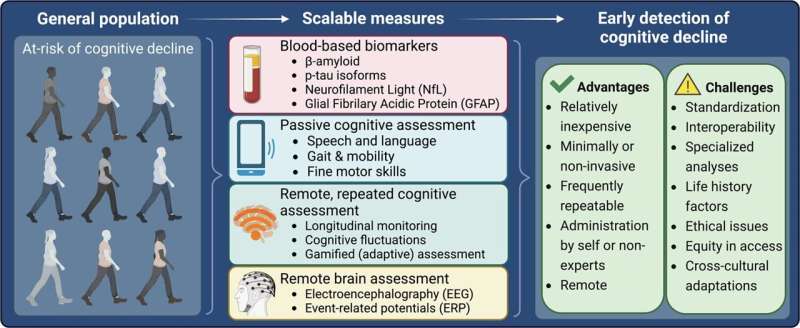
In a new study published in Translational Psychiatry, researchers at the Global Brain Health Institute (GBHI) and the School of Psychology at Trinity College describe how technology can help detect early signs of cognitive decline in neurodegenerative diseases such as Alzheimer’s.
Cognitive decline is more likely as people age. Over the coming decades, as the proportion of the world’s population over the age of 60 rapidly grows, the rates of cognitive decline due to diseases such as Alzheimer’s will become increasingly prevalent.
Many neurodegenerative diseases start several years before obvious symptoms appear, providing a window of opportunity to identify cognitive decline when impairment is non-existent or has little impact on daily function. However, as current detection methods are invasive, expensive or time-consuming they are unsuitable for wide-spread longitudinal monitoring of asymptomatic individuals.
In their recent study the research team describes ways in which emerging technology can help detect the very earliest, subtle signs of cognitive decline; outlining scalable, repeatable and relatively non-invasive strategies which if deployed on a large scale would have individual and societal benefits.
Early detection of cognitive decline may reduce adverse outcomes such as loss of autonomy and may also mitigate the high healthcare costs that occur in the decade before formal diagnosis. Furthermore, in the event that disease-modifying therapies become widely available for neurodegenerative diseases, healthcare systems will require scalable measures for identifying patients at an early stage of the disease.
Professor Rob Whelan, Associate Professor of Psychology, Trinity College and Faculty Member, GBHI said, “Recent scientific developments mean that data can now be collected outside the lab. People can collect their own high quality brain data at home or use apps on their phones to test specific cognitive functions such as memory.
“New developments such as these are vital because we can potentially measure cognitive performance in very large numbers of people for a relatively low cost. Scalable methods of detecting early cognitive decline could transform how we identify diseases such as Alzheimer’s.”
Key highlights
- Recent developments allow neuropathology associated with potential cognitive decline to be accurately detected from peripheral blood samples.
- Advances in smartphone technology facilitate unobtrusive passive measurements of speech, fine motor movement and gait, that can be used to predict cognitive decline.
- Specific cognitive processes can be assayed using ‘gamified’ versions of standard laboratory cognitive tasks, which keep users engaged across multiple test sessions.
- High quality brain data can be regularly collected at-home by users with portable electroencephalography.
Professor Marcia Cominetti, Global Atlantic Fellow for Equity in Brain Health, Associate Professor, Universidade Federal de São Carlos, said, “Methods to identify blood-based biomarkers associated with cognitive decline have great potential for addressing this important health challenge. However, there will be barriers to overcome such as ensuring equity in access to new technologies and addressing the complex ethical issues raised by early diagnosis.”
The review article, “Developments in scalable strategies for detecting early markers of cognitive decline,” is published in Translational Psychiatry.
More information:
Robert Whelan et al, Developments in scalable strategies for detecting early markers of cognitive decline, Translational Psychiatry (2022). DOI: 10.1038/s41398-022-02237-w
Journal information:
Translational Psychiatry
Source: Read Full Article




